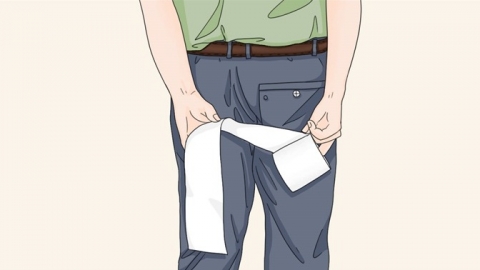How to effectively relieve itching caused by hemorrhoids
Generally, the causes of anal itching due to hemorrhoids may include secretion irritation, nerve sensitivity, anal eczema, external hemorrhoids, and hemorrhoid infection. Treatment options, under a physician's guidance, may involve general treatments and medication therapy. Detailed explanations are as follows:

1. Secretion Irritation
When hemorrhoids occur, intestinal mucus, blood, or other inflammatory substances may exude around the anal area. Prolonged irritation of these secretions on the perianal skin can easily cause itching. It is advisable to wash the anal area daily with warm water, maintain cleanliness and dryness, and avoid using alkaline soaps, such as regular soap, which may exacerbate itching.
2. Nerve Sensitivity
The hemorrhoids themselves and accompanying inflammation may irritate nerve endings around the anus, increasing nerve sensitivity and causing an exaggerated response to mild stimuli, which may manifest as itching. Avoid prolonged sitting or standing, and engage in appropriate physical activities, such as walking, jogging, or yoga, to improve perianal blood circulation and reduce the occurrence and progression of hemorrhoids.
3. Anal Eczema
Anal eczema is typically a skin inflammatory reaction caused by various internal and external factors, with lesions commonly limited to the anal opening and surrounding skin. Local skin irritation may cause itching, which may be accompanied by symptoms such as redness and rashes. Follow medical advice to use medications such as tacrolimus ointment, hydrocortisone butyrate cream, or erythromycin ointment for treatment.
4. External Hemorrhoids
External hemorrhoids may be associated with diet and bowel habits. When external hemorrhoids become swollen and enlarged, the anal skin may stretch excessively, leading to itching. Pain and swelling may also occur. Under a physician's recommendation, medications such as Xiongdan Zhiling Ointment, Xiongdan Zhiling Suppository, or Zhisuning Tablets may be used for treatment.
5. Hemorrhoid Infection
Hemorrhoid infection may occur due to an inflammatory reaction in the blood vessels within the hemorrhoid tissue, leading to local tissue necrosis and increased exudate. This exudate contains bacteria and other microorganisms that irritate the surrounding skin, causing itching. Symptoms such as stabbing pain and fever may also appear. Under a physician's guidance, medications such as cefuroxime axetil tablets, roxithromycin dispersible tablets, or potassium permanganate solution may be used for treatment.
To effectively prevent this symptom, patients should wash the anal area daily with warm water, keep it dry, and avoid using irritating cleansers in daily life. Additionally, increasing the intake of dietary fiber-rich foods such as vegetables and fruits can promote intestinal motility and help prevent constipation.








